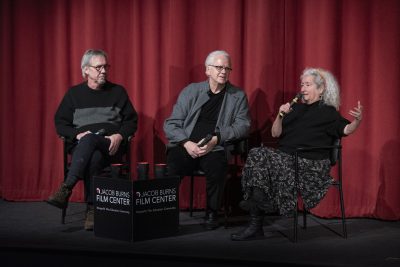Robbins’ ‘Roberts’ Still Relevant More Than 30 Years Later
News Based on facts, either observed and verified directly by the reporter, or reported and verified from knowledgeable sources.
By Brian Kluepfel

“Bob Roberts” was well-received when it appeared in 1992, a witty, scathing indictment of the American political process.
Told through the lens of a right-wing folkie who crafts songs pandering to excessive wealth and demeaning social welfare programs, it’s a sort of perverse looking-glass reflection of the 1960s revolution, upended by a demon, guitar-wielding preacher.
Since director, writer and actor Tim Robbins made the film, the political ugliness and cultural divisiveness in the United States has only worsened.
“We’ve all been through this crucible,” said Robbins in a panel discussion after a screening of the film last Friday at the Jacob Burns Center. “These things don’t seem to change, but it seems pervasive, the need to hold onto power.”
Joined by his brother, David, with whom Robbins composed the film score (the fraternal team also worked together on the score of “Dead Man Walking”) and Nora Guthrie, daughter of Woody Guthrie, arguably America’s most important and influential folk musician, the trio discussed the film’s relevance three decades after its making and what might be done today to cut through the national discord.
The panelists each had their folk and political bona fides: the Robbins brothers grew up in Greenwich Village in the 1960s. Their father, Gil Robbins, was a member of the noted Highwaymen folk group and owner of the Gaslight Café. Their ability to turn the left-leaning spirit of those times on its head is the lifeblood of “Bob Roberts,” in particular the spoofing of Bob Dylan album covers and videos.
Nora Guthrie has been promoting and protecting her father’s legacy over the past four decades and now monitors it from the Woody Guthrie Publications office in Mount Kisco, where she lives. Projects with Billy Bragg and Wilco (“Mermaid Avenue”), the Klezmatics and Boston Irish punk-folkies the Dropkick Murphys continue to reinvigorate the Woody Guthrie legacy.
Speaking of her collaboration with Tim Robbins, she praised him, saying “his understanding of folk music is really, really good.” In fact, Robbins performed at one of the 2013 anniversary concerts celebrating Woody Guthrie’s 100th birthday.
After spoofing folk themes through much of two hours, over the closing credits, a lesser-known Guthrie tune, “I’ve Got to Know,” solemnly ends the film. Robbins said the song’s earnestness and honesty provided a “cleansing” after the cynicism and nastiness of the film.
“Woody’s voice was a clear and honest voice of truth,” said the actor.
In a contemporary atmosphere of war and poverty, the Ukraine and Gaza, the questions Guthrie asked in song decades ago are still relevant:
What makes your boats haul death to my people?
Nitro blockbusters, big cannons and guns?
Why doesn’t your ship bring food and some clothing?
I’ve sure got to know, folks, I’ve sure got to know!
Why can’t my two hands get a good payin’ job?
I can still plow, plant, I can still sow!
Why did your lawbook chase me off my good land?
I’d sure like to know, friend, I’ve just got to know!
The timing of producer Forrest Murray’s request for use of a Guthrie recording of the song was almost serendipitous. Only Sweet Honey in the Rock had ever released the song, and the group demurred on using their version in the film. However, when Nora Guthrie combed through her father’s archive, she found the song, sung by Woody, on a seven-inch reel-to-reel tape (Guthrie used to send such “demos” to his record company from the family’s Coney Island home.)
She remarked about her father’s ability to distill a wide-ranging message in “I’ve Got to Know.”
“Ten verses cover the whole thing.” she said, reminding her of John Steinbeck’s frustration with Woody’s song “Tom Joad.”
“It took me 340 pages to do what he did with 18 verses,” exclaimed the author.
“Bob Roberts” brought some current Hollywood names to the silver screen when they were lesser known: Jack Black in his celluloid debut as a star-struck Roberts acolyte, a baby-faced John Cusack as a television host and Giancarlo Esposito (Gus Fring in “Breaking Bad”) as an investigative reporter. Nowadays, laughed Guthrie, the film is referred to as having “a star-studded cast.”
Addressing our current malaise, Robbins was equivocal, yet hopeful, in his assessment.
“I’m very scared of demonizing 80 million people,” he said.
Citing his Actors Gang Prison Project, which has resulted in a much-reduced recidivism rate in California jails where it operates, Robbins said, “There is hope in the individual…towns and villages. We have to find the microcosm and not the macrocosm.”
Regarding the electoral process, he bemoaned the situation which is reduced to “my big guy against your big guy… I don’t think electing anyone to office will change things.”
Guthrie noted that, 80 years ago, when things turned terribly dark around the world, her father joined the U.S. Merchant Marines and took up the fight against tyranny, scrawling “This Machine Kills Fascists” across the face of his guitar. There may come a time to make that stand again.
The old union-organizing folk song asked, “Which side are you on?” Citizens of the world may have to answer that soon, if they haven’t already. Meanwhile, the audience was reminded of the final frame of “Bob Roberts,” which contained one word in all caps: VOTE.

Examiner Media – Keeping you informed with professionally-reported local news, features, and sports coverage.


